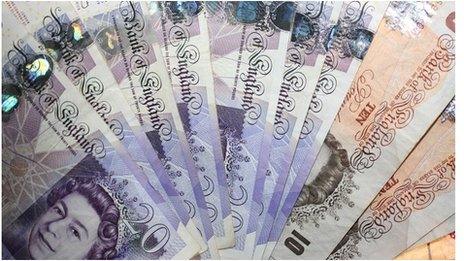Bankers 'must swear oath' after scandals, says report
- Published
- comments

An oath would prioritise the needs of bankers' customers
An oath for bankers should be introduced to raise accountability and standards in banking, said the think tank ResPublica.
It said the lack of public trust in banking after numerous scandals was an "ongoing concern" for the industry and the government.
In a new report, ResPublica called for an oath for bankers to "fulfil their proper moral and economic purpose".
Small businesses should also be treated as consumers, said the report.
'Road to absolution'
The think tank said this could ensure banks treated struggling firms fairly.
Director at ResPublica, Philip Blond, said: "As countless scandals demonstrate, virtue is distinctly absent from our banking institutions.
"Britain's bankers lack a sense of ethos and the institutions they work for lack a clearly defined social purpose."
He said an oath would "finally place bankers on the road to absolution".
The think tank said the British Bankers' Association, Building Societies Association and the new Banking Standards Review Council should adopt the oath for their members.
An extract from the oath says: "I will do my utmost to behave in a manner that prioritises the needs of customers.
"It is my first duty to provide an exemplary quality of service to my customers and to exhibit a duty of care above and beyond what is required by law."
'Part of answer'
Another part adds: "I will confront profligacy and impropriety wherever I encounter it, for the conduct of bankers can have dramatic consequence for society."
BBA executive director for financial policy and operations, Paul Chisnall, said: "Restoring trust and confidence is the banking industry's number one priority.
"But meaningful cultural change in an industry as complex and diverse as banking takes time."
He said a banking oath "very well could be part of the answer".
ResPublica also said bank shareholders should have more responsibility to make sure banks are held to account.
The full report, Virtuous Banking: Placing ethos and purpose at the heart of banking, was launched on Tuesday by the chairman of the Banking Standards Review Council, Sir Richard Lambert.
Speaking to the BBC, Mr Lambert said: "Over the last ten or 15 years ... the norms of behaviour in bits of the banking sector have slipped out to a way which is unacceptable".
"I am strongly in favour or robust regulation, but the law can only go so far.
"Banks should decide what is the purpose of banking.
"Why are they in business? Are they there just to maximise profits, are they a utility, are they there to serve the public and not make profits? What are they for?"
'Client wellbeing'
On Monday Lloyds Banking Group was fined £218m for "serious misconduct" over a key interest rate set in London, Libor.
Part of the fine, from the Financial Conduct Authority, was for abusing a scheme set up by the Bank of England to help the financial industry during the crisis.
Richard Jeffrey from Cazenove Capital Management told the BBC that it was "shocking that Lloyds was biting or, at least trying to bite, the hand that was feeding it.
He said: "A lot has changed in the banking industry. I think ethics have changed but a lot needs to be done.
"Banks were far more inwardly focussed on the money they were generating ... One of the key changes we have got to see in ethics within banking is that every decision [banks take have] to be focussed on the wellbeing of your clients".
- Published25 September 2013

- Published10 January 2014

- Published6 January 2014
